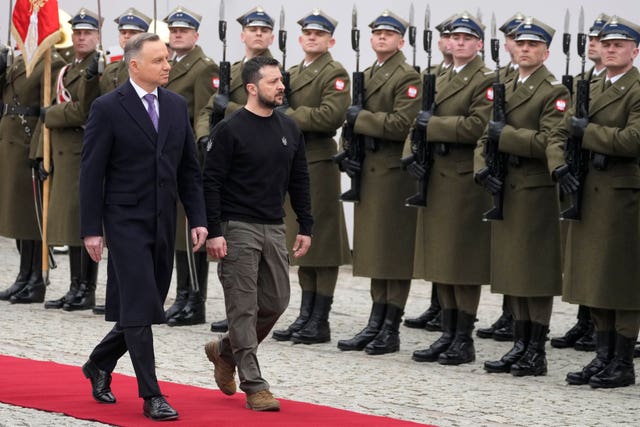
Ukrainian President Volodymyr Zelensky won new pledges of deeper cooperation on a state visit to Poland as the neighbours sought to forge a tighter relationship in defiance of Russia’s war against Kyiv.
Polish President Andrzej Duda said his country has provided four Soviet-designed MiG-29 fighter jets to Ukraine to help it beat back the Kremlin’s assault.
Four more are in the process of being handed over and another six are being prepared, he said.
Mr Zelensky said at a news conference with Mr Duda that his government would “extend a hearty welcome” to Polish businesses seeking to help Ukraine’s post-war rebuilding, which the World Bank has estimated could cost 411 billion dollars.
He met later with Prime Minister Mateusz Morawiecki and said he would sign agreements on developing Ukrainian infrastructure.
Poland heaped military honours and praise on Mr Zelensky as it welcomed him and his wife on a joint visit, during which they thanked the country for its crucial military support as well as being a haven for Ukrainian refugees.
The former Soviet satellite that is now a member of the European Union and Nato feels especially threatened by Russia and has been a leading advocate for aid to Kyiv.
Russian President Vladimir Putin, meanwhile, said Moscow’s relations with Washington are “in deep crisis” as the US has led its allies in supplying aid and weapons to Ukraine.

Speaking at a ceremony where he accepted diplomatic credentials from ambassadors of 17 nations, including the US, Mr Putin alleged that Washington’s support for the 2014 protests in Kyiv that ousted a pro-Kremlin president led to Russia’s sending troops into Ukraine.
Mr Zelensky and Mr Duda said they wanted to leave behind any Second World War-era grievances that linger in Ukraine and Poland.
“There are no taboo topics between us,” Mr Duda said. “There are still open wounds in the memory of many people.”
The visit to Warsaw was a rare wartime foray out of Ukraine for Mr Zelensky. While he also travelled to the United States, Britain, France and Belgium, the trip to Poland stood out because it was announced in advance and undertaken without the secrecy of past foreign trips.
It also was the first time Mr Zelensky and first lady Olena Zelenska travelled abroad together since the war began in February 2022, said Marcin Przydacz, head of Mr Duda’s foreign policy office.
Mr Duda awarded Mr Zelensky Poland’s oldest and highest civilian distinction, The Order of the White Eagle.
“We have no doubt that your attitude, together with the bravery of the nation, has saved Ukraine,” the Polish president told Mr Zelensky.
At a ceremony in the courtyard of the presidential palace, Mr Duda and the two countries’ first ladies were dressed in formal attire, while Mr Zelensky wore the military-style sweatshirt and khaki trousers that have become his uniform since the invasion.
Mr Zelensky travelled through Poland on his previous foreign trips, but until now had not made it his sole destination. The purpose of the journey to Warsaw was primarily to thank a country that has been an international cheerleader for Ukraine, as well as a safe haven for Ukrainian refugees and a transit hub for Ukraine-bound humanitarian aid and weapons.
The visit highlighted the central European nation’s rising role in a new international security order that has emerged from the war.
Poland is seeking to modernise its military by purchasing tanks and other equipment from US and South Korean producers. The United States has also bolstered its military presence in Poland.
Mr Zelensky also was meeting with Ukrainians who have fled to Poland. More than 1.5 million Ukrainians have registered with the Polish government since the war began.
His visit comes at a delicate time, with Polish farmers increasingly angry because Ukrainian grain that has entered the country has created a glut, causing prices to fall.
The grain is only meant to be stored temporarily before being sent to markets in North Africa and the Middle East. But farmers say the grain is taking up space in silos and entering Polish markets, causing local prices to fall. Romanian and Bulgarian farmers say they face the same problem.


Comments: Our rules
We want our comments to be a lively and valuable part of our community - a place where readers can debate and engage with the most important local issues. The ability to comment on our stories is a privilege, not a right, however, and that privilege may be withdrawn if it is abused or misused.
Please report any comments that break our rules.
Read the rules here